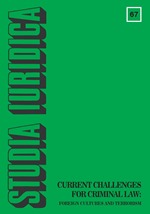OCHRONA WŁASNOŚCI NA WYPADEK ŚMIERCI. SPÓR O KSZTAŁT PRAWA SPADKOWEGO KRÓLESTWA KONGRESOWEGO
PROTECTION OF PROPERTY IN CASE OF DEATH. THE DISPUTE ABOUT THE LAW OF SUCCESSION IN THE CONGRESS KINGDOM OF POLAND
Author(s): Piotr Zbigniew PomianowskiSubject(s): Law, Constitution, Jurisprudence
Published by: Wydawnictwa Uniwersytetu Warszawskiego
Keywords: ochrona własności; ochrona własności na wypadek śmierci; prawo spadkowe Królestwa Kongresowego
Summary/Abstract: The legal protection of property is regulated by many branches of law, especially the property law and the contract law. The law of succession, which stipulates what happens with one’s property after his or her death, also plays an important role in this protection. Before the Partitions of Poland the regulations of succession varied based on the region of the country and the bequeather’s social status. For noblemen in Royal Prussia the norms of the Korektura Pruska (Ius terrestre nobilitatis Prussiae) were valid, whereas the succession of the property of members of nobility in Lithuania and Ukraine was governed by the Statutes of Lithuania. In Greater Poland and Lesser Poland customary law was in force. There were separate regulations for the bourgeoisie and the peasants. The situation did not become clear after the Partitions, when the dividing countries introduced their own law in the lands of former Polish state. In its western part the Landrecht was introduced, in southern lands – ABGB, in central region – the Napoleonic Code, and in the eastern provinces the Statute of Lithuania remained in force until 1840. Naturally, in such a situation a reform of civil law seemed necessary for many Polish lawyers. In the Congress Kingdom of Poland suggestions to change the law of succession were made inter alia by Antoni Bieńkowski. Bieńkowski claimed that it is possible to create one universal system of succession and he was certain he accomplished it. He stated that all inheritance should be acquired by a person most loved by the heir. If a bequeather loved two or more persons in the same degree, these persons participated equally in the inheritance. Cyprian Zaborowski was the one who criticized Bieńkowski’s ideas. He claimed that Bieńkowski was still mentally remaining in the Age of Enlightenment with his beliefs that everything can be explained by the reason. For Zaborowski it was obvious that law is a product of historical process and it is impossible to create one succession system that would be appropriate every time and everywhere. This dispute presents the conflict of ideas between the representatives of the Enlightenment and the German Historical School of Law in the third decade of the 19th century in the Congress Kingdom of Poland.
Journal: Studia Iuridica
- Issue Year: 2010
- Issue No: 52
- Page Range: 115-128
- Page Count: 14
- Language: Polish

